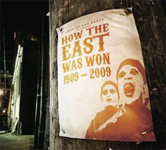|
|
 |
Dusted Reviews
Artist: V/A Album: How The East Was Won: 1989-2009 Label: Shut Up and Dance Review date: Jan. 3, 2011 |

|
|
|
 |
As key progenitors of jungle and later dedicatees of and motivators within U.K. garage, producers Shut Up And Dance, a.k.a. PJ and Smiley, carry a heavy load. Their story is one of cultural mash-ups, magpie aesthetic “theft,” street economics and legal retribution. Their rise, fall and recovery hinges around their 2002 No. 2 single “Raving I’m Raving,” which in its original form sampled Marc Cohn’s “Walking In Memphis,” something which did not go unnoticed by record company legal teams. The resultant case put Shut Up And Dance (SUAD) out of commission for several years; they’ve continued to release records since 1995 but nothing’s been quite as successful, or engaging, as those early productions. Or so it seems on first listen.
The first disc of this triple-CD set features most of said productions and it’s a breathtaking document of a genre in its nascent forms. The first batch of SUAD cuts stole breaks from hip hop and lifted the velocity, borrowed the chatter, patois and bass heft of dancehall culture, and grasped the fundamentals of simple riffs that function as earworms, reverberating in the reverb’d space of the raver’s head. Their own early tracks, like “5, 6, 7, 8” and “£20 To Get In,” offer home-spun bricolage of hip hop and dub, which comment both on rave culture’s opportunistic economics and hardcore drug use (“Autobiography Of A Crackhead”). All this and the best Prince sample I’ve heard -- a wild, flailing sting of guitar solo from “Let’s Go Crazy,” bursting from the speakers on “The Green Man.”
Some of their best productions were for the Ragga Twins, the duo of Deman Rockers and Flinty Badman, from Monserrat via North London with prior form as part of the Unity dancehall sound system. Tracks like “Spliffhead” capture much that’s great about the era -- ghostly reggae samples, whining siren noise, one-finger riffs constructed from acidic squelch, velcro-sticky noise and fluoro-light buzz, all hinged to a breakbeat caboose that’s constantly close to derailing. (The Ragga Twins were gifted their own retrospective on Soul Jazz, Ragga Twins Step Out, in 2008; there’s some overlap, but not enough to not have both.)
But some of the highlights of How The East Was Won are unexpected. Three cuts from chanteuse Nicolette are simply staggering, with her exotic voice beaming down from the outer reaches of the SUAD production aesthetic, all glistening waves of alien drone and quixotic programming. On this evidence, it’s no surprise she later shacked up as a vocalist with Massive Attack. Later in disc two, the chronology hits the early noughties, and SUAD are now producing tracks that sit amongst their new peers in U.K. garage, like “Moving Up”; or the torrid amusicality and ectoplasmic bass of “Mercury Switches”; or the surprising lift from filter disco in 2003’s “Nova.” This is perhaps the most enlightening stretch of How The East Was Won, and repeated listens start to confirm that SUAD never really lost their touch, just shifted it into other paradigms.
The final disc is all over the place, temporally, but ends with a batch of junglist cuts from 1995. Given their justifiable claim as producers that helped start jungle, it’d be churlish to deny SUAD their pleasures, and these productions are pared-back, focusing on bass weight and rhythmic intricacy, though without quite the revelatory kick of their breakbeat house cuts. I guess you only get to pioneer once, if you’re lucky, but what the rest of How The East Was Won tells is the story of two producers who managed, quite surprisingly, to keep their finger somewhere near the pulse of U.K. dance culture for a good two decades. And that symbiotic relationship with U.K. dance is the story that’s ultimately told by How The East Was Won -- whether hymning their home borough of Hackney, decrying the political disengagement of rave culture, or recording curiously home-brewed, potting-shed takes on garage, Shut Up And Dance are all about London as the city of hybrids.
By Jon Dale
|







